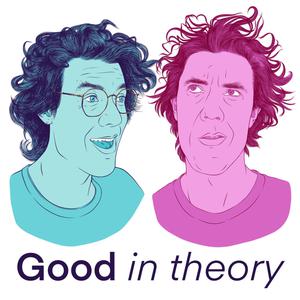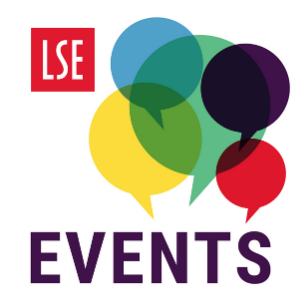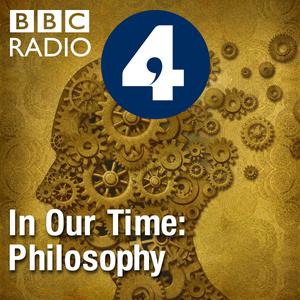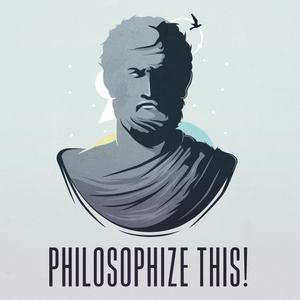
Good in Theory: A Political Philosophy Podcast
Clif Mark
Good in Theory is a podcast about political philosophy and how it can help us understand the world today. Want to know what's in Plato's Republic or Hobbes's Leviathan but don't want to read them? This is your pod. I explain my favourite books in political theory in enough detail that you’ll feel like you read them yourself. Deep but not heavy. No experience needed.
- 1 hour 4 minutes46 - Athenian democracy and Plato w/ Graham Culbertson (Everyday Anarchism Podcast)
This episode is a crossover collabo with Graham Culbertson of the Everyday Anarchism podcast. Graham asked me over to talk Athenian democracy, Plato, anarchism and how modern meritocratic education sucks. We had a nice time with it and hope you do too.
11 May 2023, 4:00 am - 1 hour 5 minutes45 - Humane War feat. Samuel Moyn
War tends to bring out the human propensity for atrocity. Nobody likes indiscriminate killing, torture and so on. What to do about it? One response is to avoid war altogether. According to Yale prof Samuel Moyn, that’s what most people wanted after World War II and after Vietnam. But more recently, he’s noticed a shift. Now, politicians, especially in America, are focussing on making more humane. Leaders like Obama say they’ll make war as ‘clean’ as possible by using drone strikes and special forces and minimizing civilian deaths and secret torture programs. That’s all well and good but Moyn sees a danger: making war more humane makes it easier to justify. If war is ‘clean’, why not wage it forever?
Samuel Moyn, Humane: How the United States Abandoned Peace and Reinvented WarMoyn’s podcast about legal theory Digging a Hole5 September 2022, 8:00 pm - 36 minutes 46 seconds44 - Samuel Huntington "The Clash of Civilizations?"
Samuel J. Huntington’s 1993 “The Clash of Civilizations?” is the most assigned article in American political science. It predicts a worldwide culture war (but not the kind you're thinking of). The book became a massive bestseller, Huntington was all over TV and his theory is still talked about all the time. It made him a darling to the press but reviled by his fellow academics. Think of "Clash" as a dark rejoinder to Fukuyama’s already-pretty-morose “End of History.” Instead of a peaceful but boring post-history, Huntington thinks that the end of the Cold War heralds a new era of worldwide civilizational conflict not only because of the Muslims (but also because of the Muslims).
17 August 2022, 8:00 pm - 54 minutes 36 seconds43 - Tyranny at Work feat. Elizabeth Anderson
Americans hate when the state tells them what to do. They’ve got freer speech, freer access to guns and less regulation on business than any other rich country.
So why do they let their work bosses walk all over them? American workers have less rights and worse conditions than workers in any other developed country. Employers can fire employees at will, impose arbitrary schedules and prevent them from forming unions. They tell them what to wear, what they can publicly say and even when they can take a shit. Why do freedom-loving Americans stand for this?
Elizabeth Anderson is a philosopher at Michigan State University, Ann Arbor. She thinks her country is in the grip of free-market ideology AKA “libertarianism” AKA “classical liberalism.” According to this viewpoint, any interference by the state in the private sector is a violation of freedom. But when the state won’t defend workers’ rights, they allow employers to subject their employees to a tyrannical form of “private government.” Freedom for the boss means servitude for the worker.
We talk about the history of this ideology, the consequences for American workers and how the tide may finally be starting to turn.
6 June 2022, 11:00 am - 54 minutes 19 seconds42 - The New Aristocracy feat. Matthew Stewart
Matthew Stewart is a philosophy PhD and author. He’s also a Princeton guy and former management consultant so he knows rich people.
His new book, The 9.9%, is about them. Not the super-rich, but the doctors, lawyers and managers that go to good colleges and live in nice neighbourhoods. The “nearly rich and not-famous,” as he puts it.
We talk about how these people raise their kids, get their money and block the poorer element from their neighbourhoods. Matthew reckons the 9.9% are a new kind of aristocracy that’s entrenching inequality and making everyone hate parenting. In the end, it’s not really the white collar player he hates; it’s the game of inequality. Though he doesn’t sound very fond of the players either.
2 May 2022, 2:00 pm - 58 minutes 22 seconds41 - Love in the Time of Big Data feat. Alfie Bown
Big tech companies tell us they’re our servants, existing to fulfill our desires more cheaply and conveniently than ever. Alfie Bown doesn’t think so. He thinks Deliveroo, Tinder, Pornhub etc. aren’t just giving us what we want, they’re shaping what we want. He reckons our tech overlords are secretly remaking humankind on the level of desire.
We chat about Chinese cars that know what you want to eat and why time travellers don’t get horny.Bown is the author of a new book called Dream Lovers: The Gamification of Relationships
18 April 2022, 11:00 am - 1 hour 14 minutes40 - Is Liberal Democracy the Best We Can Do? feat. The Morality of Everyday Things
Is democracy the worst form of government except for all the others or is it just the worst?
This is a crossover with the delightful Morality of Everyday Things podcast. Jake and Ant and I discuss what liberal democracy is, the arguments in its favour, and some big critiques. Episode includes Plato, Nazis and Lizards. Enjoy!
Also, go listen to MOET pod!
ReferencesFrancis Fukuyama, The End of History and the Last Man
Carl Schmitt The Crisis of Parliamentary Democracy
Karl Popper, The Open Society and its Enemies
8 February 2022, 3:00 pm - 1 hour 13 minutes39 - The Glorious History and Ugly Present of Rhetoric feat. Rob Goodman
Rhetoric is supposed to inspire. Imagine Cicero exhorting the Roman people, Churchill vowing to “fight on the beaches.” Yet, when politicians speak today, it’s almost always boring or obnoxious. Why?
Prof. Rob Goodman, author of Words on Fire: Eloquence and its Conditions comes by today to talk about the history of rhetoric, what Cicero knew that we don’t, and the political speech styles of Trudeau (boring), Trump (obnoxious), and X González (pretty great, actually).
24 January 2022, 6:00 pm - 39 minutes 35 seconds38 - GiT Holiday Special with Sep
It’s the holidays again! And Theory Elf Sep comes on to help celebrate them. We talk about the past year of working on the pod, where I've been for the past two months, how she makes the episode art and what we have planned for the coming year. We also call Rebecca!
26 December 2021, 7:00 pm - 36 minutes 35 seconds37 - Thought Lab 4: The Psychology of Horror
Grizzly bears are scary. But what about zombie grizzly bears? What’s makes something horrifying rather than just frightening?
Paul has a theory. It turns out that humans have a psychological way of organizing the world that also creates the possibility of getting really creeped-out. It helps explain the horror of the zombie grizzly why the old Dracula was creepier than Twilight and how war propaganda can turn enemies into monsters.
ReferencesDavid Livingstone-Smith (philosopher where Paul’s getting his ideas about essentialism and dehumanization from)
Credits
Paul Sagar
Clayton Tapp (intro)
David Zikovitz (outro)
Sep (art)28 October 2021, 2:00 pm - 33 minutes 36 seconds36 - Moral Saints 2: Why Be a Saint?
This episode is about Wolf’s “Moral Saints,” Peter Singer’s “Famine, Affluence and Morality,” and Larissa Macfarquhar’s Strangers Drowning.
Susan Wolf thinks that devoting your life to helping others would be a real drag. It’d interfere with playing tennis and reading Tolstoy.
True enough but some people might have philosophical and personal reasons to do it anyway.
For example, Peter Singer argues that, if you think a child’s life is worth more than your shoes, then you’re morally obliged to give away all your money to charity.
Larissa Macfarquhar helps out with the personal reasons. She’s written a book that profiles a whole bunch of real-life do-gooders. And it turns out that even though the saintly life is tough, the saints are getting something out of it. And from their perspective, a life of Tolstoy and tennis might not be a great as Wolf makes it out to be.
References
Macfarquhar, Strangers Drowning
Singer, “Famine, Affluence, and Morality”
Wolf, “Moral Saints”12 October 2021, 1:00 pm - More Episodes? Get the App
Your feedback is valuable to us. Should you encounter any bugs, glitches, lack of functionality or other problems, please email us on [email protected] or join Moon.FM Telegram Group where you can talk directly to the dev team who are happy to answer any queries.
 The Gray Area with Sean Illing
The Gray Area with Sean Illing
 Philosophy For Our Times
Philosophy For Our Times
 LSE: Public lectures and events
LSE: Public lectures and events
 The Partially Examined Life Philosophy Podcast
The Partially Examined Life Philosophy Podcast
 In Our Time: Philosophy
In Our Time: Philosophy
 Philosophize This!
Philosophize This!